 Petzlover
Petzlover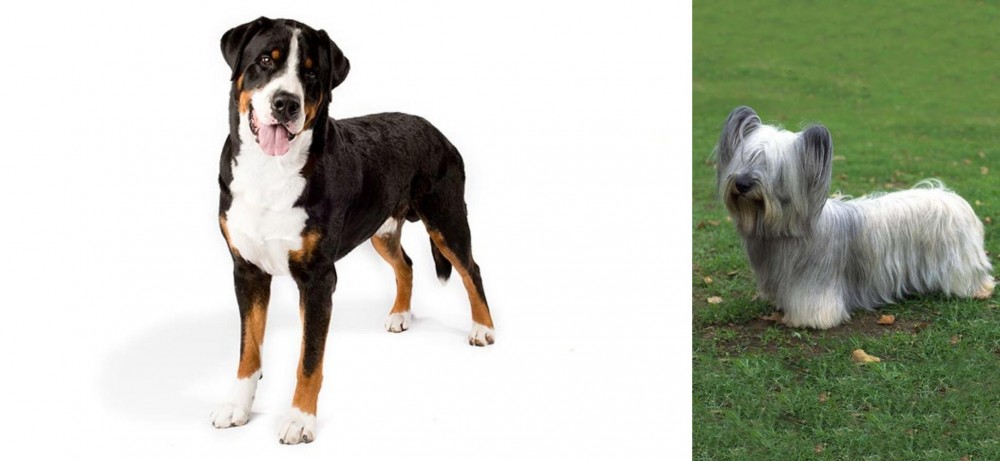 Greater Swiss Mountain Dog is originated from Switzerland but Skye Terrier is originated from United Kingdom. Greater Swiss Mountain Dog may grow 46 cm / 19 inches higher than Skye Terrier. Greater Swiss Mountain Dog may weigh 52 kg / 115 pounds more than Skye Terrier. Greater Swiss Mountain Dog may live 3 years less than Skye Terrier. Greater Swiss Mountain Dog may have more litter size than Skye Terrier. Both Greater Swiss Mountain Dog and Skye Terrier requires Moderate Maintenance.
Greater Swiss Mountain Dog is originated from Switzerland but Skye Terrier is originated from United Kingdom. Greater Swiss Mountain Dog may grow 46 cm / 19 inches higher than Skye Terrier. Greater Swiss Mountain Dog may weigh 52 kg / 115 pounds more than Skye Terrier. Greater Swiss Mountain Dog may live 3 years less than Skye Terrier. Greater Swiss Mountain Dog may have more litter size than Skye Terrier. Both Greater Swiss Mountain Dog and Skye Terrier requires Moderate Maintenance.
 Hailing from Switzerland, and one of its oldest dog breeds, the Greater Swiss Mountain Dog has a dubious history in that there are a number of theories as to its origin. He is closely related to the Bernese Mountain Dog, Saint Bernard and Rottweiler.
Hailing from Switzerland, and one of its oldest dog breeds, the Greater Swiss Mountain Dog has a dubious history in that there are a number of theories as to its origin. He is closely related to the Bernese Mountain Dog, Saint Bernard and Rottweiler.
Of all the theories, the one that says he is descended from large, mastiff-like dogs is a popular one. He used to be a herding- and guard dog, but also was used to pull carts of farm produce.
It was in the 1900s that the dog’s numbers started dwindling. In 1908, canine researcher, Albert Heim recognized the dogs as being large members of the Sennenhund type, a family of four breeds that includes the Greater Swiss Mountain Dog.
He wanted to see the dogs recognized as a separate breed and the Swiss Kennel Club listed the Greater Swiss Mountain Dog in 1909.
In 1968 they were brought to the United States and a club for them was formed. The dog was recognized by the American Kennel Club in 1995 with the dog being recognized as a member of the Working group.
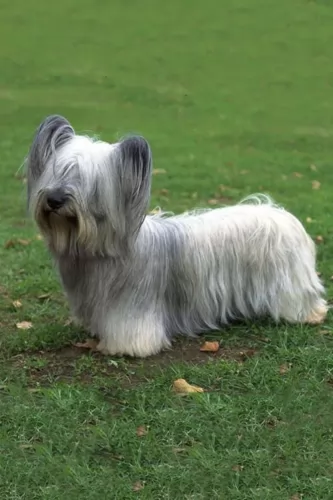 The Skye Terrier is a hardy dog breed and is actually considered to be an endangered native dog breed in the United Kingdom.
The Skye Terrier is a hardy dog breed and is actually considered to be an endangered native dog breed in the United Kingdom.
They were found on the Isle of Skye, although there is some confusion about its history. They were used long ago to hunt but these days they are essentially companion dogs.
They found their way to America and the Skye Terrier Club of America was founded in 1938. The American Kennel Club recognized the breed in 1887.
 Swissies, as they are often referred to as, are large, robust dogs, standing at 65–72cm and weighing anything between 50 – 70kg, with the females being slightly smaller and weighing a little less.
Swissies, as they are often referred to as, are large, robust dogs, standing at 65–72cm and weighing anything between 50 – 70kg, with the females being slightly smaller and weighing a little less.
He has big, rounded paws, medium length floppy ears, a broad chest and a long tail. This is a heavy-boned dog, strong while still being agile.
His dense, double coat is black, white and tan or rust, with black on top of the dog's back, ears, tail and legs. There are two rust dots above each eye. The coat can be short and straight to medium length, coarse and wavy. The dog sheds throughout the year with a major shedding a couple of times a year.
The Greater Swiss Mountain Dog is a sociable canine, thriving on being part of a loving human family. While he used to be a working farm dog, today he is essentially a family pet, though he loves to still be busy.
He is generally friendly with strangers, but just like with all other dog breeds, he will need to be trained and socialized to turn him into an even-tempered, obedient dog, capable of getting on well with children and pets in the the home.
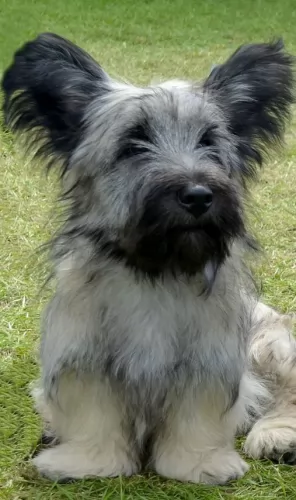 The Skye Terrier is a medium-sized dog standing at between 23 and 26cm in height and weighing between 12 and 18kg. The legs are short and sturdy. He is double coated with the top coat being straight and hard and forming a beard around the face area. The coat can be fawn, and in various shades of grey which are sometimes even black. The ears of the dog are medium sized and erect.
The Skye Terrier is a medium-sized dog standing at between 23 and 26cm in height and weighing between 12 and 18kg. The legs are short and sturdy. He is double coated with the top coat being straight and hard and forming a beard around the face area. The coat can be fawn, and in various shades of grey which are sometimes even black. The ears of the dog are medium sized and erect.
The Skye Terrier has always been a hunting dog and he enjoys quite a bit of exercise – walks, ball games as well as indoor games. Small though he may be, he is strong willed with a mind of his own and will benefit from being trained and socialized.
This is also necessary as he has a fairly reserved nature. He gets on well with children and makes an excellent family pet but he is ready to take on smaller pets in the home. He will bark when confronting strangers and makes an excellent watchdog too.
He is able to adapt well into life in the city or the countryside. He isn’t a dog to be left outside day after day and will just die of boredom, frustration and loneliness.
 The Swissy is an easy going dog and adapts easily into his human family’s lifestyle. He is big, but agile dog known for his gentle temperament.
The Swissy is an easy going dog and adapts easily into his human family’s lifestyle. He is big, but agile dog known for his gentle temperament.
While he loves the outdoors, he is a social dog and loves nothing more than coming indoors and being close to his human family.
He loves his family and won’t do well if left outside for days without human companionship. Treat him well and you’ll be rewarded with a loyal, loving 4-legged family member.
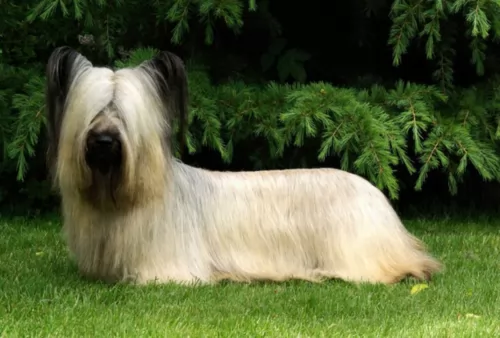 Give the Skye Terrier the attention he wants and he will reward you with his loving companionship.
Give the Skye Terrier the attention he wants and he will reward you with his loving companionship.
He loves the entire family but is best suited to homes where children have been taught to be kind to animals and to treat them with respect.
He has moderate energy levels and will expect you to give him a fair amount of exercise. The Skye Terrier can make an excellent companion for you and your family.
 The GSMD or Sennenhund, as his name is shortened to, is a fairly healthy dog breed, with very few health issues.
The GSMD or Sennenhund, as his name is shortened to, is a fairly healthy dog breed, with very few health issues.
He has an average lifespan of 10 to 12 years, and although not likely, he can suffer from minor problems such as gastric torsion as well as female urinary incontinence. If your female dog is dribbling urine in her sleep, there are a number of reasons that can be causing it - bladder infections, a medical condition or a weakened bladder with spayed female dogs.
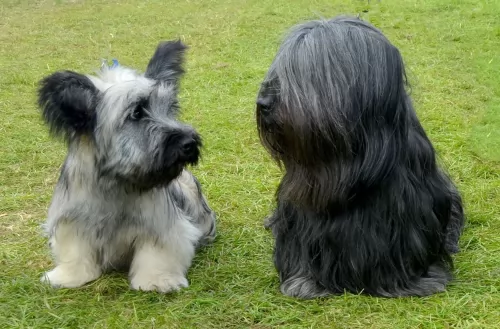 The Skye Terrier is a healthy dog breed. Perhaps the only issue that could be a problem with him is orthopedic problems. He is an achondroplastic dog, meaning a large body on small legs.
The Skye Terrier is a healthy dog breed. Perhaps the only issue that could be a problem with him is orthopedic problems. He is an achondroplastic dog, meaning a large body on small legs.
He could develop spinal problems if he were allowed to constantly be jumping off beds and high chairs.
Orthopedic problems affect the bones, muscles and joints and can actually be debilitating. Orthopedic conditions can be ligament tears or hip dysplasia for instance, accompanied by arthritis.
You’ll notice your dog has an abnormal way of walking or running, inability to get up once lying down and he may have arthritis and pain.Be careful because obesity can trigger problems with the joints and bones.
 The Greater Swiss Mountain Dog is a robust dog and thrives on a diet of kibble to raw meat to some cooked home-made food such as chicken, brown rice and vegetables.
The Greater Swiss Mountain Dog is a robust dog and thrives on a diet of kibble to raw meat to some cooked home-made food such as chicken, brown rice and vegetables.
A serious issue with the GSMD is overfeeding, resulting in uncomfortable digestive problems and of course, obesity.
Your GSMD isn’t a dog that is going to require a lot of exercise like some of the other dog breeds there are, but still his working career of the past requires that he still be taken on daily walks, enjoys ball- and rope games and to go swimming.
Brush your dogs coat at least twice a week to remove loose hears. Other grooming aspects include cleaning the ears to avoid infection, clipping his nails and brushing his teeth at least twice a week.
If you’re not sure how to do all these things, there are useful accessories for dogs that allow you to do all this grooming on your own. Your vet can also show you how as these are all things that will require ongoing attention.
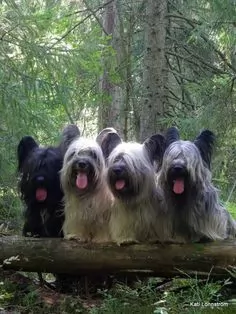 ● The coat of the Skye Terrier is long and silky and will most certainly require brushing every day if you keep the hair long. Such silky hair can easily become matted.
● The coat of the Skye Terrier is long and silky and will most certainly require brushing every day if you keep the hair long. Such silky hair can easily become matted.
● Little dogs like this will need their teeth being checked regularly. You can even try to buy special pet toothpaste and toothbrush and brush his teeth yourself. If you prefer, a professional dog groomer can do this for you and at the same time trim his nails and check his ears and clean the insides of the ears too to avoid infection.
● Provide him with top quality food as the quality of the dog food you buy makes a huge difference to his health and longevity. He is a small dog and there are some excellent commercially manufactured dog foods specially made for small, energetic dogs.
Try to include some home-made food for him which can be simply mixed into the dry kibble twice a week. Boiled chicken, brown rice or pasta and spinach, sweet potatoes and carrots is super tasty and nutritious. Ensure there is always a bowl of fresh, cool water within his reach.
● Keep his vaccines up to date against some deadly canine diseases, and get him to the vet when he shows signs of illness.